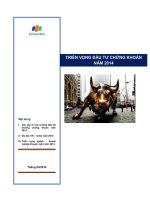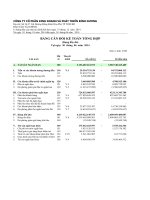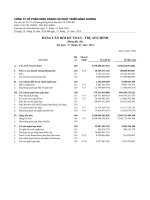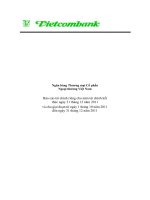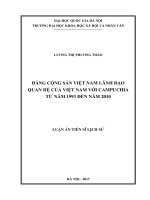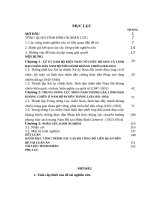Bài tập tiếng Anh 6 sách Smart World cả năm
Bạn đang xem bản rút gọn của tài liệu. Xem và tải ngay bản đầy đủ của tài liệu tại đây (2.81 MB, 192 trang )
1
UNIT 1: HOME
A. VOCABULARY (TỪ VỰNG)
Lesson 1
No
Words
Transcription
Meaning
1
apartment
(n)
/əˈpɑːrt mənt/
Chung cư
2
balcony
(n)
/ˈbỉlkəni/
Ban cơng
3
basement
(n)
/ˈbeɪsmənt/
Tầng hầm
4
garage
(n)
/ɡəˈrɑːʒ/
Nhà để xe, ga-ra
5
gym
(n)
/dʒɪm/
Phòng tập thể dục
6
yard
(n)
/jɑːrd/
Cái sân
Lesson 2
No
Words
Transcription
Meaning
7
bed
(n)
/bed/
Cái giường
8
clean
(v)
/kliːn/
Dọn dẹp, rửa
9
dinner
(n)
/ˈdɪnər/
Bữa tối
10
dish
(n)
/dɪʃ/
Cái đĩa
11
kitchen
(n)
/ˈkɪtʃən/
Nhà bếp
12
laundry
(n)
/ˈlɔːndri/
Việc giặt là (ủi)
13
shopping
(n)
/ˈʃɒpɪŋ/
Việc mua sắm
Lesson 3
No
Words
Transcription
Meaning
14
center
(n)
/ˈsentər/
Trung tâm
15
city
(v)
/ˈsɪti/
Thành phố
16
east
(n)
/ iːst/
Phía đơng
17
north
(n)
/ nɔːrθ/
Phía bắc
18
south
(n)
/ saʊθ/
Phía nam
19
town
(n)
/ taʊn/
Thị trấn, thị xã
20
village
(n)
/ˈvɪlɪdʒ/
Ngôi làng
2
21
west
(n)
/west/
Phía tây
Further words
No
Words
Transcription
Meaning
22
attention
(n)
/əˈtenʃən/
Sự chú ý
23
delta
(n)
/ˈdeltə/
Đồng bằng
24
region
(n)
/ˈriːdʒən/
Vùng
25
temperature
(n)
/ˈtemprətʃər/
Nhiệt độ
26
museum
(n)
/mjuːˈziːəm/
Viện bảo tàng
27
college
(n)
/ˈkɒlɪdʒ/
Cao đẳng/ Đại học
28
restaurant
(n)
/ˈrestrɒnt/
Nhà hàng
29
possession
(n)
/pəˈzeʃən/
Sự sở hữu
30
transportation
(n)
/ˌtrænspɔːˈteɪʃən/
Sự vận tải
B. GRAMMAR (NGỮ PHÁP)
I. Thì hiện tại đơn (The simple present)
1. Cấu tạo
+ Câu khẳng định
ST
Động từ to be
S + am/ is/ are+ N/ Adj
- I + am
Động từ thường
S + V(s/es)
- I/ We/ You/ They/ Danh từ số nhiều +
Công - He/ She/ It/ Danh từ số ít/ Danh
V(ngun thể)
thức từ khơng đếm được + is
- He/ She/ It/ Danh từ số ít/ Danh từ
- You/ We/ They/ Danh từ số nhiều không đếm được + V(s/es)
+ are
Ví dụ - He is a lawyer.
(Ông ấy là một luật sư)
- I often go to school by bus
- The watch is expensive.
(Tôi thỉnh thoảng đến trường bằng xe
buýt)
(Chiếc đồng hồ rất đắt tiền)
- He usually gets up early.
- They are students.
(Anh ấy thường xuyên dạy sớm)
3
- She does homework every evening.
(Họ là sinh viên)
(Cô ấy làm bài về nhà mỗi tối)
- The Sun sets in the West.
(Mặt trời lặn ở hướng Tây)
- Với các từ có tận cùng là “o”, “ch”, “sh”, “x”, “s” thì khi dùng với ngơi số ít,
thêm đi “es”. (go – goes; do – does; watch – watches; fix – fixes, miss – misses,
wash - washes )
- Với các từ có tận cùng là “y” thì khi dùng với ngơi số ít, bỏ “y” và thêm đuôi
“ies” (copy – copies; study – studies)
- Với các từ cịn lại, thêm đi “s”. (see – sees; play – plays,…)
- Câu phủ định
Động từ “to be”
Công
thức
S + do/ does + not + V(nguyên thể)
S + am/are/is + not +N/ Adj
Chú ý is not = isn’t
(Viết tắt) are not = aren’t
Ví dụ
Động từ chỉ hành động
- I am not a teacher.
(Tôi không phải là một giáo
viên.)
(Trong đó: “do”, “does” là các trợ động
từ.)
do not = don’t
does not = doesn’t
- I do not (don’t) often go to school by
bus
- He is not (isn’t) a lawyer.
(Tôi không thường xun đến trường
bằng xe bt)
(Ơng ấy khơng phải là một
luật sư)
- He does not (doesn’t) usually get up
early.
- The watch is not (isn’t)
expensive.
(Anh ấy không thường xuyên dạy sớm)
(Chiếc đồng hồ không đắt
tiền)
- They are not (aren’t)
students.
- She does not (doesn’t) do homework
every evening.
(Cô ấy không làm bài về nhà mỗi tối)
- The Sun does not (doesn’t) set in the
South.
4
(Họ không phải là sinh viên)
(Mặt trời không lặn ở hướng Nam)
- Đối với câu phủ định, phần động từ thường, các bạn rất hay mắc phải lỗi thêm
“s” hoặc “es” đằng sau động từ. Các bạn chú ý:
Chủ ngữ + don’t/ doesn’t + V (ngun thể - khơng chia)
Ví dụ:
- Câu sai: She doesn’t likes chocolate. (Sai vì đã có “doesn’t” mà động từ “like”
vẫn có đi “s”)
→ Câu đúng: She doesn’t like chocolate.
? Câu nghi vấn
a. Câu nghi vấn sử dụng trợ động từ (Câu hỏi Yes/ No)
Động từ to “be”
Công
thức
Q: Am/ Are/ Is (not) + S + N/Adj?
A: - Yes, S + am/ are/ is.
- No, S + am not/ aren’t/ isn’t.
Q: Are you a engineer?
Ví dụ
(Bạn có phải là kỹ sư khơng?
A: Yes, I am. (Đúng vậy)
No, I am not. (Không phải)
Động từ chỉ hành động
Q: Do/ Does (not) + S + V (nguyên
thể)?
A: - Yes, S + do/ does.
-
No, S + don’t/ doesn’t.
Q: Does she go to work by taxi?
(Cô ấy đi làm bằng taxi phải
khơng?)
A: Yes, she does. (Có)
No, she doesn’t. (Khơng)
b. Câu nghi vấn sử dụng từ hỏi bắt đầu bằng WhĐộng từ to “be”
Động từ chỉ hành động
Công
thức
Wh- + am/ are/ is (not) + S +
N/Adj?
Wh- + do/ does (not) + S + V
(nguyên thể)…?
Ví dụ
- Where are you from? (Bạn đến từ - Where do you come from?
đâu?)
(Bạn đến từ đâu?)
- Who are they? (Họ là ai?)
- What do you do? (Bạn làm nghề
5
gì?)
2. Cách dùng
- Thì hiện tại đơn được sử dụng để:
+ Nói về một thói quen lặp đi lặp lại hàng ngày: I always get up at 6.am
+ Nói về sự thật, chân lý hiển nhiên: The sun sets in the west
+ Nói về khả năng của ai đó: She plays basketball very well
C. EXERCISE (BÀI TẬP)
❶ PHONETICS
I. Choose the words whose underlined part is pronounced differently from that of
the others in each group.
1. A. gym
ndry
B. sky
2. A. island
B. seafood
C. balcony
D. lau
C. serve
D. summer
3. A. information
ansportation
4. A. live
5. A. delta
ention
6. A. speaking
aring
7. A. farmers
arks
8. A. museums
ols
9. A. stores
ilies
10. A. asked
painted
B. population
B. listen
C. question
C. think
D. tr
D. write
B. garage
C. basement
D. att
B. teaching
C. cleaning
D. we
B. groups
B. apartments
B. temples
B. watched
C. markets
D. p
C. buildings
D. scho
C. houses
D. fam
C. washed
D.
6
II. Choose the word whose main stressed syllable is placed differently from that
of the other in each group.
11. A. center
kitchen
12. A. machine
ping
13. A. delta
wn
14. A. balcony
B. temperature
15. A. museum
ssession
B. basement
C. garage
B. laundry
C. dinner
B. canal
C. country
C. restaurant
B. attention
D.
D. shop
D. hometo
D. apartment
C. secondary
❷ VOCABULARY
I. Write the suitable word for each picture.
1. apartment
2. pool
3. garage
4. yard
5. balcony
6. gym
D. po
7
II. Fill in the blanks with words from the unit. The first letter is already there.
(Student’s book, Review 1. Page 87)
1. I like sitting outside on my _balcony_ when it's hot.
2. North, East, South, and _West_ are the four cardinal points of the compass.
3. After eating dinner, I do the _dishes_.
4. I live in the countryside. My _village_ is very small. It only has a few houses
and one store.
5. My house has a very big _yard_. I like playing soccer there with my friends.
6. Does your uncle live in a villa in Ha Noi? - No, he doesn’t. He lives in
an _apartment_.
III. Fill in the blanks using the words in the box. (Workbook, Unit 1. Page 2)
balcony village
yard
garage
city
pool
flowers gym apartment
1. My mother goes to the _gym_ twice a week.
2. A _village_ is in the countryside and usually has a few houses.
3. Does your apartment have a _balcony_?
4. Did you park the car in the _garage_?
5. A: Does your house have a big _yard_?
6. B: Yes, it does. We plant trees and _flowers_ there.
7. We asked for a hotel room with a _pool_.
8. Our _apartment_ is small and has two bedrooms.
9. A _city_ has many big buildings, schools, parks and hospitals.
IV. Read the sentences and choose the correct answers (Workbook, Unit 1. Page
4)
1. My sister often makes breakfast/ dinner in the morning.
2. The plates are dirty. I need to do the shopping/ dishes.
3. Jenny makes breakfast/ does the dishes after eating lunch.
4. Let’s clean the bathroom/ eat breakfast. It’s so dirty.
5. My mom do the shopping/ laundry. My clothes are always really soft.
6. We’re out of juice. Can you buy some when you do the laundry/ shopping?
❸ GRAMMAR
8
I. Underline the mistake in each sentence. Write the correct word on the line.
(Student’s book, Review 1. Page 87)
1. What are Manchester famous for?
is
2. My house have a balcony and a garage.
has
3. I do lots of housework! I cleaning the bedroom on the weekend.
4. Do your family have a car?
clean
Does
5. What housework does you do?
do
6. My sister and I don't making the dinner.
make
7. There is two seasons: the dry season and the rainy season.
are
II. Underline the mistake in each sentence. Write the correct word on the line.
1. I often gets up early to catch the bus to go to work.
2. She teach students in a local secondary school.
get
teaches
3. They doesn’t own a house. They still have to rent one to
live.
don’t
4. Dang Van Lam am a famous goalkeeper in the National Football Team.
5. What do your sister do?
does
6. John and Harry doesn’t go swimming in the lake.
7. Jenny speak Vietnamese very well.
don’t
speaks
8. How often does she goes shopping in the supermarket?
9. Our dogs aren’t eat bones.
10. Jenny’s parents is very friendly and helpful.
is
go
don’t
are
III. Read the sentences. Underline the correct words. (Workbook, Unit 1. Page 3)
1. Excuse me. Could/ Should I ask you some questions?
2. Yes/ No, sure.
3. Are/ Do you live in a house or an apartment?
4. I live/ lives in a house.
5. Does it have/ has a pool?
6. No, it doesn't/ don't.
7. It has/ have three bedrooms.
9
8. Does it has/ have a balcony?
9. Yes, it does/ do.
10. Does Tom's house has/ have a yard and a pool?
IV. Read the sentences. Underline the correct words. (Workbook, Unit 1. Page 5)
1. My mother make/ makes breakfast.
2. My sister do/ does the laundry.
3. My brother do/ does the dishes.
4. My father make/ makes the bed.
5. I clean/ cleans the kitchen.
6. Lily do/ does the shopping.
7. Jack and Paul make/ makes dinner together.
8. Lily's dad clean/ cleans the bathroom.
9. Their mom do/ does the most housework.
10. My brother play/ plays football very well.
V. Fill in the blanks with the correct form of the verbs. (Student’s book, Unit 1.
Page 7)
1. My brother (live) _ lives_ in the USA.
2. We (have)_have_ a dog.
3. Does he (live) _live_ in Hanoi?
- No, he doesn’t. He (live) _lives_ in Huế.
4. My house (not have) doesn’t have a yard.
5. Do you live in a house?
- No, I don't. I (live) _live_ in an apartment.
6. Do they (have) _have_ a car?
- Yes, they do.
VI. Fill in the blanks with the correct form of the verbs.
1. My mom always (make) makes delicious meals.
2. Jenifer (not eat) doesn’t eat eggs.
3. Susie (go) goes shopping every week.
4. Do Minh and Hoa (go) go to work by bus every day?
5. Do your parents (agree) agree with your decision?
10
6. Where does he (come) come from?
7. Where does your father (work) work?
8. Jimmy doesn’t usually (not water) water the trees.
9. Who (do) does the washing in your house?
10. They (eat) eat out once a month.
VII. Fill in the blanks with the correct form of the verbs.
1. It (be) is a fact that smart phone (help) helps us a lot in our life.
2. I often (travel) travel to some of my favorite destinations every summer.
3. Our Math lesson usually (finish) finishes at 4.00 p.m.
4. The reason why Susan (not eat) doesn’t eat meat is that she (be) is a vegetarian.
5. People in Phu Tho (be) are very friendly and they (smile) smile a lot.
6. The flight (start) starts at 6 a. m every Thursday.
7. Peter (not study) doesn’t very hard. He never gets high scores.
8. I like oranges and she (like) likes apples.
9. My mom and my sister (cook) cook lunch every day.
10. They (have) have breakfast together every morning.
❹READING
I. Read Ken's blog post about his family and circle the correct answers.
(Student’s book, Unit 1. Page 9)
Today I want to talk about housework in my family. I think I do the most
housework in my family. I clean the kitchen every day. I do the dishes, too. My
mom does the shopping. She's a teacher in a school. My sister is a college student.
She doesn't do anything! She doesn't make her bed or clean her room. My dad
cleans her room after work. He's a chef in a restaurant so he makes dinner. He does
the laundry and cleans the bathroom, too. Hmm. Now, I really think about it, my
dad does the most housework.
1. What does Ken write about?
2. Who does the shopping?
Ken's school/ Ken's family
Ken's sister/ Ken's mom
11
3. Who makes dinner?
Ken's mom/ Ken's dad
4. Who does the laundry?
Ken's dad/ Ken's mom
5. Who does the most housework in Ken's family?
Ken/ Ken's dad
II. Read the paragraph and answer the questions. (Student’s book, Unit 1. Page
13)
Cần Tho is a city in the south of Vietnam. It is in the Mekong Delta, on the
Hậu River. Many people live in Cần Tho. It is a big city. Lots of people visit it to
see its floating markets and beautiful rivers. The weather is hot. It is very good for
growing food. Farmers grow rice, vegetables, and different fruits. It is an important
center for business and transportation.
Questions:
1. Where is Cần Thơ?
- It is in the south of Vietnam.
2. What is it famous for?
beautiful rivers.
3. What's the weather like?
4. What do the farmers grow?
fruits.
- It is famous for its floating markets and
- It is hot.
- They grow rice vegetables, and different
III. Read the email and answer the questions. (Workbook, Unit 1. Page 7)
Send
To:
Subject: Burano
Dear Stella,
Thanks for letting me know about your hometown.
Let me tell you about my hometown, Burano.
Burano is an island in the north of Italy, about 7 km from Venice. You can take a
40-minute
waterbus ride from Venice. It is famous for its colorful houses. You can take great
photos wherever you are on the island. Burano is also famous for its seafood. A
lot of restaurants serve great, fresh seafood at cheap prices. Burano is very quiet
and peaceful. About three thousand people live here.
It is better to visit Burano in summer because it is very cold in winter.
12
Please write back soon. I want to know about your family.
Your friend,
Ricardo
Questions:
1. Where is Burano?
2. How can you get to Burano?
Venice.
3. What is Burano famous for?
and seafood.
- It's in the north of Italy.
- You can take a waterbus to Burano from
4. How many people live there?
there.
5. When is the best time to visit Burano?
summer.
- Burano is famous for its colorful houses
- About three thousand people live
- The best time to visit Burano is
IV. Read the article about Boston. Choose the best word (A, B, or C) for each
space.
(Workbook, Review 1. Page 62)
Boston is a (1)............. in the northeast of the USA. About seven hundred
thousand people live there. Boston is one of the oldest cities in the USA and has a
rich history. You can (2)............ about the history of the city by walking along the
Freedom Trail. Boston is also (3) ............ for its many art museums. Some
museums let you visit for free some evenings. Spring and fall are the best times to
(4)............. Boston. However, hotels can (5) ............. expensive in May and
September. You will get a cheaper price in January and February. Boston is a place
you should visit if you (6)............. to the USA.
1. A. store
B. hotel
2 A. exercise
B. teach
3. A. excited
ting
4. A. go
5. A. be
6. A. learn
B. exciting
B. visit
B. is
B. stay
C. city
C. work
D. country
D. learn
C. famous
C. stay
C. been
C. love
D. interes
D. study
D. are
D. travel
13
V. Reading Read about the three places. Choose the correct answer (A, B, or C).
(Student’s book, Review 1. Page 86)
Beautiful Places in the World
A. Lijiang is a city in the south of China. About 1.2 million people live there. It
has many small canals and stone bridges. Many people visit Lijiang to see the
dancing and singing show on Jade Dragon Snow Mountain.
B. Austin is a city in the south of the USA. About 950 thousand people live
there. There are lots of beautiful parks in Austin. People enjoy walking or
cycling in the parks or along the river.
C. Sydney is a city in the southeast of Australia. It is the largest city in the
country. About 5.2 million people live there. There are many nice beaches in
Sydney. It is a great place to go swimming and surfing.
Questions:
1. Which place has lots of stone bridges?
___A___
2. Which place has nice parks?
___A___
3. Which place has the most people?
___B___
4. Which place is famous for a show?
___D___
5. Which place is good for taking a walk?
6. Which place is by the sea?
___D___
___A___
❺ WRITING
I. Unscramble the questions. Answer the questions using your own ideas.
(Workbook, Unit 1. Page 5)
1. What/do/housework/you/do?
What housework do you do?
I make the beds.
2. housework/ does/ What/ your mother/ do?
What housework does your mother do?
My mother does the dishes.
3. does/ your father/ do?/ What/housework
14
What housework does your father do?
My father makes dinner.
4. your brother or sister/ does/ What/ do?/ housework
What housework does your brother or sister do?
My brother does the shopping
5. the most/ Who/ housework?/ does
Who does the most housework?
My dad does the most housework.
II. Use your notes to write a paragraph about your hometown. Write 40 to 50
words.
My
hometown
is……………………………………………………………………………………
……………………………….
It
is
in……………………………………………………………………………………
………………………………………………
It
is
a………………………………………………………………………………………
…………………………………………….
It
is
famous
for……………………………………………………………………………………
…………………………………
The
weather
is……………………………………………………………………………………
…………………………………
I
like……………………………………………………………………………………
………………………………………………..
My hometown is Nha Trang. It is in the center of Vietnam. It is a city. It
is famous for its beautiful beaches and seafood. The weather is hot. I like my
hometown because I love going to the beach.
15
D. FURTHER PRACTICE
I. Choose the words whose underlined part is pronounced differently from that of
the others in each group.
1. A. sister
2. A. kitchen
. men
B. his
B. vegetable
3. A. cake
B. village
4. A. bus
5. A. women
ki
B. fun
B. spring
6. A. machine
singer
C. police
C. egg
C. make
D. six
D
D. paper
C. sunny
C. gym
B. dinner
C. fish
II. Put “do/ don’t/ does/ doesn’t” in each blank to complete the sentences.
1. My mother likes chocolate, but she doesn’t like biscuits.
2. Do the children wear their uniform at your school?
3. Lynn’s father watches badminton on TV, but he doesn’t watch judo.
4. Where do the Masons buy their fruit?
5. Does the cat like to sleep on the sofa?
6. Dogs love bones, but they don’t love cheese.
7. Where do Sam and Ben hide their pocket money?
8. We eat pizza, but we don’t eat hamburgers.
9. Does Miss Jenny read magazines?
10.
Do the boys play cricket outside?
11.
Please don’t play with your food.
12.
She does the cleaning three times a week.
13.
We don’t go out very much because we have a baby.
14.
I don’t want to talk about my neighborhood anymore.
15. How much does it cost to phone overseas?
III. Underline the correct answers
D. busy
D. s
D.
16
1.
We sometimes (read/ reads) books.
2.
Emily (go/ goes) to the art club.
3.
It often (rain/rains) on Sundays.
4.
Pete and his sister (wash/washes) the family car.
5.
I always (hurry/ hurries) to the bus stop.
6.
She (speak/ speaks) four languages.
7.
Jane is a teacher. She (teach/ teaches) English.
8.
Those shoes (cost/ costs) too much.
9.
My sister (go/ goes) to the library once a week.
10.
We both (listen/ listens) to the radio in the morning.
IV. Rearrange the words to complete the sentences.
1.
always / at nine o’clock / out of the garage / in the morning / drives / his
car / he
He always drives his car out of the garage at nine o’clock in the morning.
2.
a parking place / near the shops / they / find / rarely
They rarely find a parking place near the shops.
3.
fly / with my parents / to Florida / sometimes / I / in spring
I sometimes fly to Florida with my parents in spring.
4.
late / comes / she / often / to school / in winter
She often comes to school late in winter.
5.
meet / at the sport ground / they / after dinner / always / their friends
They always meet their friends at the sport ground after dinner.
6.
enjoys / swimming / in our pool / always / in the morning / she
She always enjoys swimming in our pool in the morning.
7.
mother / On / the / my / always / washing / does / Mondays
On Mondays, my mother always does the washing.
8.
out / once / put / I / dustbins / week / the / a
17
I put out the dustbins once a week.
9.
a / go / with / often / walk / dog / for / We / our
We often go for a walk with our dog.
10.
sister / ironing / sometimes / My / the / does
My sister sometimes does the ironing.
V. Choose the correct answer.
1. I _________ know the correct answer.
A. am not
B. not
C. don’t
D. doesn’t
2. They _________ agree with my opinion.
A. are
B. don’t
C. aren’t
D. do
3. Kathy usually _________ in front of the window during the class.
A. sits
B. sitting
C. sit
D. is sit
4. What does this word _________?
A. means
B. meaning
C. mean
D. is mean
5. He _________ share anything with me.
A. don’t do
B. isn’t
C. not
D. doesn’t
6. I come from Canada. Where _________ you come from?
A. are
B. do
C. is
D. not
7. Jane _________ tea very often.
A. doesn’t drink
B. drink
C. is drink
D. isn’t drink
8. How often _________ you play tennis?
A. do
B. are
C. is
D. have
9. They _________ rice in cold climates.
A. isn’t grow
10.
B. don’t grow
C. aren’t grow
D. doesn’t grow
I _________ a compass and a calculator in Maths lesson.
A. am use
B. use
C. aren’t use
D. doesn’t use
IV. Give the correct form of the verbs to complete the sentences.
18
1.
They play hockey at school.
2.
She doesn’t write poems.
3.
Do you speak English?
4.
My parents don’t like fish.
5.
Does Anne have any hobbies?
(have)
6.
Andy’s brother works in a big building.
(work)
7.
Do Jim and Joe water the flowers every week?
8.
Kent’s mother doesn’t ride a motorbike.
9.
Does Elisabeth knock the door?
10.
(play)
(not/ write)
(speak)
(not/like)
(water)
(not/ride)
(knock)
What do you buy in the school canteen?
(buy)
UNIT 2: SCHOOL
A. VOCABULARY (TỪ VỰNG)
Lesson 1
No
Words
Transcription
Meaning
1
biology
(n)
/baɪˈɒlədʒi/
Môn Sinh học
2
geography
(n)
/ dʒiˈɒɡrəfi/
Môn Địa lý
3
history
(n)
/ ˈhɪstri/
Môn Lịch sử
4
I.T
(information
technology)
(n)
/aɪ ’ti:/ (/ɪnfə
ˌmeɪʃən tek
ˈnɒlədʒi/)
Môn Tin học
5
literature
(n)
/ ˈlɪt.rə.tʃər/
Môn Văn học
6
music
(n)
/ ˈmjuː.zɪk/
Môn Âm nhạc
7
P.E (physical
education)
(n)
/ piː iː /(/ ˌfɪz.ɪ.kəl
ed.jʊˈkeɪ.ʃən/)
Môn Thể dục
8
physics
(n)
/ˈfɪzɪks/
Mơn Vật lý
Lesson 2
No
9
Words
act
Transcription
(v)
/ ỉkt/
Meaning
Diễn xuất
19
10
activity
(n)
/ ỉkˈtɪvəti/
Hoạt động
11
arts and
crafts
(n)
/ ˌɑːts ən ˈkrɑːfts/
Thủ cơng mỹ nghệ
12
drama club
(n)
/ ˈdrɑː.mə klʌb/
Câu lạc bộ kịch
13
indoor
(adj)
/ ˌɪnˈdɔːr/
Trong nhà
14
outdoor
(adj)
/ ˈaʊtˌdɔːr/
Ngoài trời
15
sign up
(v)
/ saɪn ʌp/
Đăng ký
Lesson 3
No
Words
Transcription
Meaning
16
adventure
(n)
/ ədˈventʃər/
Cuộc phiêu lưu
17
author
(n)
/ ˈɔːθər/
Tác giả
17
fantasy
(n)
/ˈfæntəsi/
Kỳ ảo
18
mystery
(n)
/ ˈmɪstəri/
Bí ẩn
19
novel
(n)
/ ˈnɒvəl/
Tiểu thuyết
Further words
No
Words
Transcription
Meaning
20
peaceful
(adj)
/ˈpiːsfl/
n bình/ thanh bình
21
beautiful
(adj)
/ˈbjuːtɪfl/
Đẹp
22
capital
(n)
/ˈkỉpɪtl/
Thủ đơ
23
secret
(n)
/ˈsiːkrət/
Bí mật
24
event
(n)
/ɪˈvent/
Sự kiện
25
strange
/streɪndʒ/
Lạ
(adj)
B. GRAMMAR (NGỮ PHÁP)
I. Using “and”/ “or” for listing
1. We use “and” to join two or more nouns in a positive sentence
I like English and music.
I like English, math and music.
2. We use “or” to join two or more nouns in a negative sentence
20
I don’t like English or music.
I don’t like English, math or music.
II. Possessive pronouns: mine and yours
My favorite subject is English. What’s yours?
Mine’s math.
III. Using “like” to talk about school activities
1. We use “like + verb-ing”
I like doing outdoor activities.
I like speaking English.
C. EXERCISE (BÀI TẬP)
❶ PHONETICS
I. Choose the words whose underlined part is pronounced differently from that of
the others in each group.
1. A. geography
D. together
2. A. mystery
gn
3. A. author
ther
4. A. physics
erature
B. technology
B. fantasy
B. things
B. history
5. A. adventure
y
B. math
6. A. mountain
uld
B. around
7. A. farmers
nimals
8. A. teenagers
B. problems
B. parts
C. negative
C. music
D. si
C. Thursday
D. o
C. biology
D. lit
C. capital
C. pronoun
C. crafts
C. months
D. activit
D. sho
D. a
D. adults
21
9. A. games
ovies
10. A. booked
B. tables
B. placed
C. sentences
C. missed
D. m
D. acted
II. Choose the word whose main stressed syllable is placed differently from that
of the other in each group.
11. A. music
rect
B. outdoor
C. novel
D. cor
12. A. physics
oor
B. event
C. author
D. ind
13. A. biology
D. technology
B. geography
C. literature
14. A. adventure
tory
B. fantasy
C. mystery
15. A. education
vision
B. information
C. intonation
16. A. drama
bject
17. A. literature
raphy
B. baseball
C. suggest
D. his
D. tele
D. su
B. biology
C. activity
D. geog
18. A. music
orm
19. A. fantasy
B. history
B. soccer
C. physics
D. perf
20. A. novel
ce
B. decide
C. favorite
❷ VOCABULARY
I. Write the suitable word for each picture.
D. adventure
C. author
D. scien
22
1. Maths
2. Biology
3. History
4. Literature
5. Chemistry
6. Technology (IT)
7. English
8. Art
9. Physics
23
10. Geography
11. Music
12. Drama
13. Physical education
(PE)
14. Science
15. Dancing
II. Read the sentences. Circle the correct answers.
1. I like__________ because I like reading stories.
A. literature
B. math
C. physics
gy
D. biolo
2. I like to learn about plants and how they grow. I like__________.
A. I.T
h
B. biology
C. history
3. I like computers. That's why I like__________.
A. I.T
B. P.E
C. history
cs
4. I love to learn about mountains and rivers. I like__________.
A. I.T
B. physics
C. English
aphy
D. mat
D. physi
D. geogr
24
5. I don't like running and playing sports. I don't like__________.
A. literature
B. P.E
C. math
D. history
6. Studying helps me learn about countries around the__________ world and famous
people in the past.
A. music
B. history
C. biology
D. math
7. I love to learn how light, heat, and sound work. I love__________.
A. geography
B. biology
C. physics
D. music
III. Fill in the blanks using the words in the box.
sign
up
drama
club
arts and
crafts
indoor
activities
outdoor
activities
act
1. Why don't you sign up for a book club?
2. Chris wants to be an actor. He's learning how to act at school.
3. Jane likes acting. She joined the drama club at school.
4. Some students love doing arts and crafts because they can make pretty things
from paper.
5. Volleyball and table tennis are indoor activities. We often play them in the
sports center.
6. Many students like playing soccer and tennis. They're outdoor activities.
IV. Fill in the blanks using the words in the box.
sign
up
history
arts and
crafts
fantasy novel geography
drama
club
literature
1. My favorite subject is history I like learning about people in the past.
2. Harry Potter is a famous fantasy series. Many people love the magical world in
the books.
3. There are many arts and crafts projects before the holidays. You can learn how
to make beautiful cards and decorations.
4. Her first novel is about her childhood in the south of India. Many people,
especially girls and women, love it because they can see themselves in her story.
5. Why don't you sign up for an outdoor activity? Being outdoors is great for your
health.
25
6. Matt doesn't like literature. He thinks all the books he has to read in the class
are boring.
7. We learn about different countries in geography class.
8. The drama club is looking for actors for their new play.
❸ GRAMMAR
I. Circle the correct words.
1. My favorite sport is tennis. What’s mine/ yours?
- I like soccer.
2. I found a bag. Is it mine/ yours?
- No, it isn't. My bag is here.
3. This book isn't my book. Mine/Yours is blue. Is it yours?
- Yes, it is.
4. I saw a red hat on the table. Isn't yours/mine red?
- No, mine is blue.
5. What's your favorite ice cream? Mine/Yours is chocolate.
- I like chocolate, too.
6. Do you have a ruler? Mine/Yours is at home.
- Sure, here you are
II. Rewrite the verbs using “-ing”.
Verb
Verb-ing
1. sing
singing
2. draw
drawing
3. cut
cutting
4. read
reading
5. dance
dancing
6. get
getting
7. act
acting
8. paint
painting
9. sign
signing
10. listen
listening
11. swim
swimming
12. read
reading
13. happen
happen
14. play
playing
15. join
joining
Meaning

